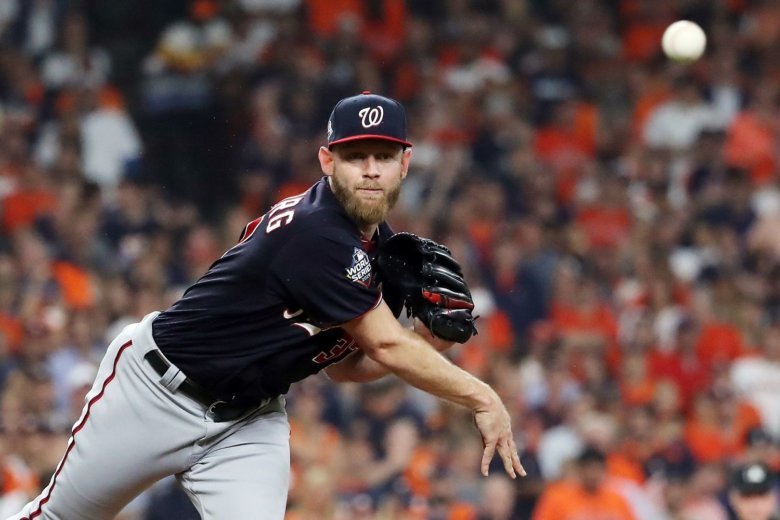
Two of the Washington Nationals’ most important players are free agents, despite efforts on the team’s part to avoid such a scenario.
Fresh off their World Series run, Anthony Rendon and Stephen Strasburg opted for free agency over potential extensions of team control and testing the open market this offseason.
Fans who don’t understand the inner workings of the professional sports labor market might balk at such a decision. For veterans of many courtroom battles working to establish free agency in professional sports over the last several decades, staying under contract when you have the ability to earn more for your abilities is a non-starter.
“There’s absolutely no good argument for it — zero,” Jim Quinn, author of the new book “Don’t Be Afraid to Win: How Free Agency Changed the Business of Pro Sports” told WTOP in a recent interview. “If I was representing a player, I would always tell them to explore the open market. They can always come back, if they want.”
Quinn has an extensive personal history with this particular topic, representing all four top-level men’s professional sports’ players associations during his four decade legal career. His own stake in the battles began with the NBA’s fight for free agency in the 1970s.
His book chronicles each major twist and turn, back to the beginning, with the 21-minute strike ahead of the 1964 NBA All-Star Game, which forced union recognition by the owners.
That long history — along with a collection of behind-the-scenes moments he wanted to share — was the impetus for the project in the first place.
“I was thinking about these issues for a long time,” said Quinn. “There are a lot of good stories, some funny stuff, some interesting stuff.”
In the 55 years since that first strike, the labor landscape has changed dramatically for professional athletes, but labor battles remain a major point of tension between players and owners.
“Frankly, the ownership side often wanted to keep the fans in the dark on all of this,” said Quinn. “It’s a business. It’s no different from the entertainment business. It is the entertainment business, and a big chunk of it.”
Still, even if he saw the potential for greater earnings, Quinn would never guessed how big.
“No way. If I had said, in 1975, ‘I think the average NBA salary would be $10 million,’ (colleague Larry Fleischer) would have had me shot.”
And yet, even as pro sports have ballooned into this behemoth, and even as MLB rakes in record profits, teams have started spending less in recent offseasons. The MLBPA has made overtures at the idea of owner collusion, charges which took on new life again just last week.
“It’s a very difficult question,” said Quinn, saying he didn’t know enough about the particulars to make a judgment. “Obviously there has been a slowdown to the signings at some level.”
As MLB front offices have treated the luxury tax more like a hard salary cap, competitive, major market teams have started to consider the once-unthinkable: Trading their franchise players. Just this week, rumors of the Cubs trading Kris Bryant and the Red Sox trading Mookie Betts — players instrumental to their teams’ respective recent World Series titles — are running rampant.
Meanwhile, outside of a couple top-tier free agents, teams have largely punted on heavy offseason spending, choosing profit margins over actual wins, pulling the sport into an existential (and, potentially, a labor) crisis.
“Baseball’s young superstars are massively underpaid,” said Quinn. “I think there probably needs to be some sort of restructuring as to how the system works.”
There’s also the issue of minor league pay which, outside of those players on 40-man rosters or with big league service time, falls well shy of a living wage. Major League Baseball has floated the idea of slashing more than 40 minor league teams entirely, putting players out of work and shuttering community sports teams in small towns across the country.
Quinn said there’s a much simpler fix that doesn’t require such drastic measures.
“There’s always a solution, it just means that the owners make less money,” he said. “That’s the rational solution.”
Less simple is giving the minor leaguers a voice, much less a seat at the table to bargain for more respectable wages. The players’ union is currently structured for Major League players only.
“It’s a very complicated labor issue as to whether or not minor leaguers are in the bargaining unit,” said Quinn.
But back to the big league level, and the Nats. When Strasburg signed his extension it was a bit of a surprise, given the thin free agent pitching market that upcoming offseason.
For a pitcher who already had one Tommy John surgery in the rearview, $175 million was no small guarantee. Now, with $100 million left on the last four years of his deal, coming off a World Series MVP, his open-market value is greater.
That makes this the perfect time to test the market, even with another opt-out built into his contract after next season.
“Obviously when that deal was originally negotiated, it was important to Strasburg and his agent to be able to test the open market at some point,” said Quinn.
Rendon, meanwhile, reportedly turned down an extension offer shortly before he became a free agent, opting for the open market just like Bryce Harper did last year.
Both Strasburg and Rendon are available to bid their next contracts around the league and choose the offer that suits them best. Wherever they land, they weren’t afraid to take the advice that Gene Upshaw gave Quinn back in the early 1990s when he faced off against the NFL, which left an impression he used as the title of his book: Don’t be afraid to win.






